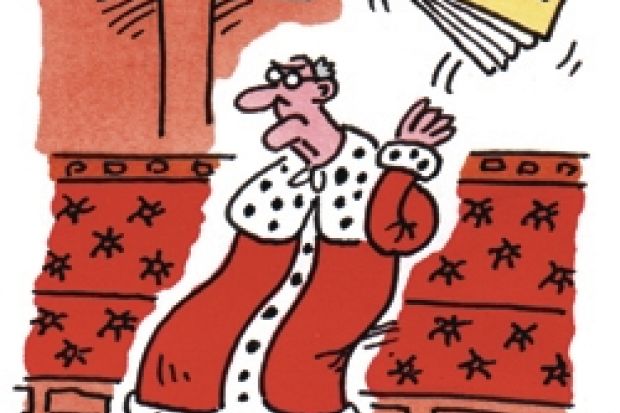The celebrity status enjoyed by University of Manchester physicist Brian Cox reached new heights on 19 August when he was unveiled as a guest columnist in The Sun. Professor Cox used his full-page slot to revel in Blackpool Football Club's return to the Premier League ("having so-called less fashionable clubs back in the top flight makes it feel like the good old days") and bash wheel-clampers ("I got clamped a few months ago ... I considered cutting the damn thing off but couldn't be bothered with the hassle"). But alongside such macho mutterings was a plea for support for UK research, arguing that money cut from the welfare bill should be spent on science instead. "That would be a Britain (of which) all hard-working, honest citizens could be proud."
The Independent provoked the ire of David Willetts on 19 August with its front-page headline: "Minister's shock advice for straight-A students seeking places at top universities: 'Must aim lower ...'." Closer scrutiny revealed that the "aim lower" quote had come from the University and College Union, although the universities minister had argued that high achievers who missed out could "look at applying for slightly less competitive universities for next year". A day later the paper said that Mr Willetts was "unhappy with the headline ...and wants us to make clear that he did not actually say 'Must aim lower.'"
The Times committed its own exam howler on A-level results day, when it took a punt and reported that 16 per cent of all grades would be A*s, twice as many as forecast. The results "will embarrass government officials and raise awkward questions for ministers striving to restore credibility to A levels", the paper said on 19 August. In the event, the embarrassment and awkward questions fell on The Times: A-level results published the same day showed that 8.1 per cent of A-level grades were A* - close to the 7 per cent figure predicted by the exam regulator Ofqual.
The A-level feeding frenzy continued with the usual tales of high-achieving asylum seekers and beauty queen contestants who had managed to pass. It was also reported on 21 August that the shortage of places meant British hopefuls were increasingly looking overseas, a fact that will please those who argue the UK has for too long seen the international student market as one-way traffic. Meanwhile, it was alleged on 22 August that top universities were discriminating against domestic students. A reporter posing as a Russian applicant was told by universities including Bath, Sheffield, Leicester and Cardiff that she could get a place with A-level results up to three grades lower than those demanded of Brits, it was claimed.
Last week's report in Times Higher Education that the authors of The Spirit Level had decided to respond only to criticism from their academic peers provoked an attack in The Independent on 21 August. Dismissing the peer review process as "largely hokum", Nigel Hawkes, director of the campaign group Straight Statistics, said that Richard Wilkinson and Kate Pickett had "surrendered any right to hide behind the flak-jacket of peer review" when they set out to write a book on such a "hugely political subject" as inequality. "Hiding behind peer review is a betrayal of all the principles of academic life, of open dialogue, of freedom of expression and, since they are so keen on it, of equality as well. It's a disgrace," he said.
After A-level fever came the opportunity for papers to turn their doom-mongering on GCSE students, who were warned that a "domino effect" stemming from the lack of university places could see pupils squeezed out of vocational courses. The University and College Union claimed that colleges would snap up higher-qualified students who had failed to get into university at the expense of those with only GCSEs. Meanwhile, those going on to A levels were warned that if they had not excelled in their GCSEs, results of which were published on 24 August, they could already have damaged their chances of getting into university. It was claimed that a growing number are now using the results pupils achieve at 16 as a "crude filter" as competition for places rises.
Register to continue
Why register?
- Registration is free and only takes a moment
- Once registered, you can read 3 articles a month
- Sign up for our newsletter
Subscribe
Or subscribe for unlimited access to:
- Unlimited access to news, views, insights & reviews
- Digital editions
- Digital access to THE’s university and college rankings analysis
Already registered or a current subscriber?
